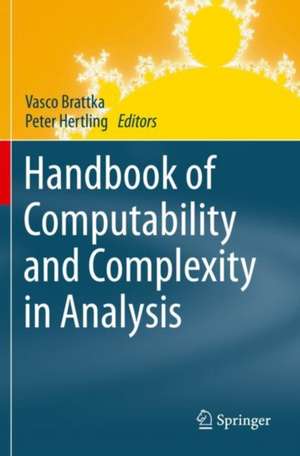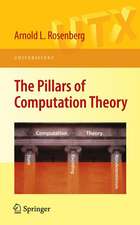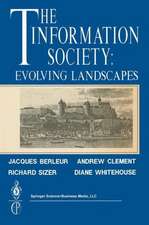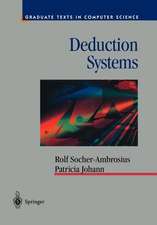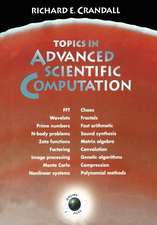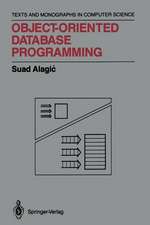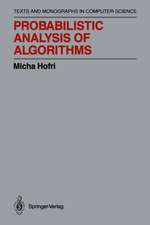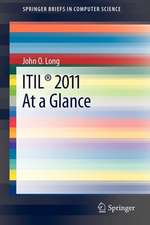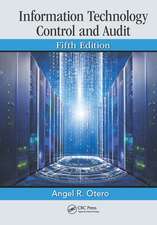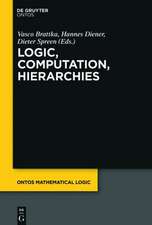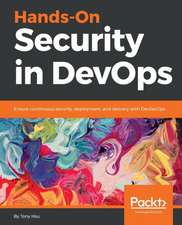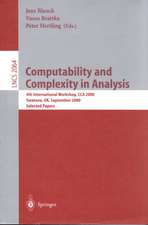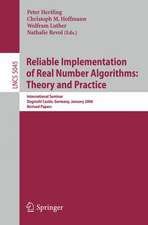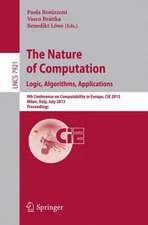Handbook of Computability and Complexity in Analysis: Theory and Applications of Computability
Editat de Vasco Brattka, Peter Hertlingen Limba Engleză Paperback – 6 iun 2022
Nowadays this theory has many different facets that embrace topics from computability theory, algorithmic randomness, computational complexity, dynamical systems, fractals, and analog computers, up to logic, descriptive set theory, constructivism, and reverse mathematics. In recent decades computable analysis has invaded many branches of analysis, and researchers have studied computability and complexity questions arising from real and complex analysis, functional analysis, and the theory of differential equations, up to (geometric) measure theory and topology.
This handbook represents the first coherent cross-section through most active research topics on the more theoretical side of the field. It contains 11 chapters grouped into parts on computability in analysis; complexity, dynamics, and randomness; and constructivity, logic, and descriptive complexity. All chapters are written by leading experts working at the cutting edge of the respective topic. Researchers and graduate students in the areas of theoretical computer science and mathematical logic will find systematic introductions into many branches of computable analysis, and a wealth of information and references that will help them to navigate the modern research literature in this field.
| Toate formatele și edițiile | Preț | Express |
|---|---|---|
| Paperback (1) | 438.33 lei 38-44 zile | |
| Springer International Publishing – 6 iun 2022 | 438.33 lei 38-44 zile | |
| Hardback (1) | 624.65 lei 38-44 zile | |
| Springer International Publishing – 5 iun 2021 | 624.65 lei 38-44 zile |
Preț: 438.33 lei
Preț vechi: 547.91 lei
-20% Nou
Puncte Express: 657
Preț estimativ în valută:
83.89€ • 87.24$ • 70.20£
83.89€ • 87.24$ • 70.20£
Carte tipărită la comandă
Livrare economică 11-17 martie
Preluare comenzi: 021 569.72.76
Specificații
ISBN-13: 9783030592363
ISBN-10: 3030592367
Pagini: 427
Ilustrații: XXV, 427 p.
Dimensiuni: 155 x 235 mm
Ediția:1st ed. 2021
Editura: Springer International Publishing
Colecția Springer
Seria Theory and Applications of Computability
Locul publicării:Cham, Switzerland
ISBN-10: 3030592367
Pagini: 427
Ilustrații: XXV, 427 p.
Dimensiuni: 155 x 235 mm
Ediția:1st ed. 2021
Editura: Springer International Publishing
Colecția Springer
Seria Theory and Applications of Computability
Locul publicării:Cham, Switzerland
Cuprins
Part I, Computability in Analysis.- Computability of Real Numbers.- Computability of Subsets of Metric Spaces.- Computability of Differential Equations.- Computable Complex Analysis.- Part II, Complexity, Dynamics, and Randomness.- Computable Geometric Complex Analysis and Complex Dynamics.- A Survey on Analog Models of Computation.- Computable Measure Theory and Algorithmic Randomness.- Algorithmic Fractal Dimensions in Geometric Measure Theory.- Part III Constructivity, Logic, and Descriptive Complexity.- Admissibly Represented Spaces and Qcb-Spaces.- Bishop-Style Constructive Reverse Mathematics.- Weihrauch Complexity in Computable Analysis.- Index
Notă biografică
Vasco Brattka is a professor for Theoretical Computer Science and Mathematical Logic at the Universität der Bundeswehr München and an Honorary Research Associate at the University of Cape Town. He is the Editor-in-Chief of Computability, the journal of the association, Computability in Europe, published by IOS Press. His research interests include computable analysis, computability theory, effective descriptive set theory, algorithmic randomness, complexity and logic, and Weihrauch complexity.
Peter Hertling is a professor in the Institut für Theoretische Informatik, Mathematik und Operations Research at the Universität der Bundeswehr München. He is an Associate Editor of the Journal of Complexity, published by Elsevier. His research interests include computable analysis, descriptive complexity and algorithmic randomness, complexity theory over the real numbers, and information-based complexity.
Textul de pe ultima copertă
Computable analysis is the modern theory of computability and complexity in analysis that arose out of Turing's seminal work in the 1930s. This was motivated by questions such as: which real numbers and real number functions are computable, and which mathematical tasks in analysis can be solved by algorithmic means?
Nowadays, this theory has many different facets that embrace topics from computability theory, algorithmic randomness, computational complexity, dynamical systems, fractals, and analog computers, up to logic, descriptive set theory, constructivism, and reverse mathematics. In recent decades, computable analysis has invaded many branches of analysis, and researchers have studied computability and complexity questions arising from real and complex analysis, functional analysis, and the theory of differential equations, up to (geometric) measure theory and topology.
This comprehensive handbook contains 11 chapters grouped into parts on computability in analysis; complexity, dynamics, and randomness; and constructivity, logic, and descriptive complexity. Researchers and graduate students in the areas of theoretical computer science and mathematical logic will find systematic introductions into many branches of computable analysis, as well as a wealth of information and references that will help them to navigate the modern research literature in this field.
Vasco Brattka is a professor for Theoretical Computer Science and Mathematical Logic at the Universität der Bundeswehr München. He is editor-in-chief of Computability, the journal of the association, Computability in Europe. Peter Hertling is a professor in the Institute for Theoretical Computer Science, Mathematics and Operations Research at UniBwM. He is an associate editor of Journal of Complexity.
Nowadays, this theory has many different facets that embrace topics from computability theory, algorithmic randomness, computational complexity, dynamical systems, fractals, and analog computers, up to logic, descriptive set theory, constructivism, and reverse mathematics. In recent decades, computable analysis has invaded many branches of analysis, and researchers have studied computability and complexity questions arising from real and complex analysis, functional analysis, and the theory of differential equations, up to (geometric) measure theory and topology.
This comprehensive handbook contains 11 chapters grouped into parts on computability in analysis; complexity, dynamics, and randomness; and constructivity, logic, and descriptive complexity. Researchers and graduate students in the areas of theoretical computer science and mathematical logic will find systematic introductions into many branches of computable analysis, as well as a wealth of information and references that will help them to navigate the modern research literature in this field.
Vasco Brattka is a professor for Theoretical Computer Science and Mathematical Logic at the Universität der Bundeswehr München. He is editor-in-chief of Computability, the journal of the association, Computability in Europe. Peter Hertling is a professor in the Institute for Theoretical Computer Science, Mathematics and Operations Research at UniBwM. He is an associate editor of Journal of Complexity.
Caracteristici
Computability and complexity theory are two central areas of research in mathematical logic and theoretical computer science Researchers and graduate students will appreciate the book's systematic introductions into many branches of computable analysis Dedicated to Klaus Weihrauch, the leading pioneer and teacher in this domain Further domain information available at http://cca-net.de/
